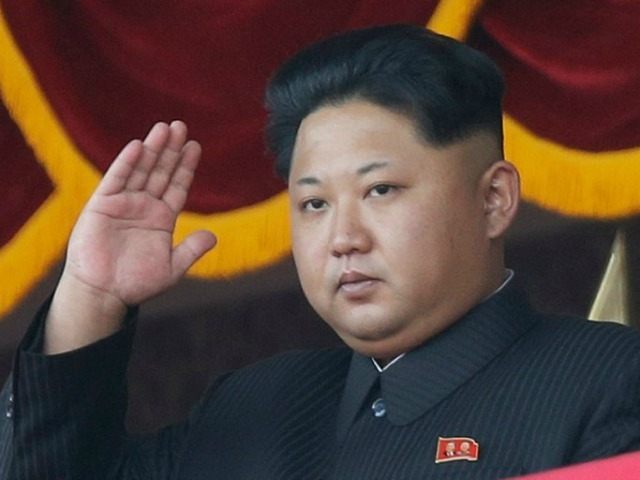North Korean dictator Kim Jong-un reportedly canceled on Wednesday a military invasion of South Korea floated this month, state media claimed, on a day state propaganda outlets also reportedly deleted large amounts of belligerent literature against the South.
South Korean news outlets also reported that large propaganda loudspeakers installed last week on the mutual Korean border had suddenly disappeared, presumably without ever broadcasting any communist propaganda into the country.
After months of diplomatic stagnation, Pyongyang abruptly began attacking South Korea in its state propaganda outlets in early June, publishing statements by Kim’s sister, Kim Yo-jong, against the “disgusting riff-raff” in South Korea who opposed communism. North Korean officials expressed particular outrage at a longstanding tradition in South Korea of using balloons to drop leaflets into North Korea with news of the outside world, which is illegal for North Korean citizens to read.
Tensions this month hit a climax when North Korea bombed a “joint liaison office” in Kaesong, on the North Korean side of the border, that the countries had used for nearly two years to make daily calls to each other. North Korea did not invest any funding in constructing the office.
This week, North Korean media threatened a nuclear attack on the United States, the first time it had done so in years.
On Wednesday, the Koreas woke up to news from the Korean Central News Agency (KCNA), the North Korean state propaganda newswire service, that Kim Jong-un – whose name had been suspiciously absent from this month’s anti-Seoul propaganda barrage – had ordered the military to stand down.
“A preliminary meeting for the fifth meeting of the Seventh Central Military Commission of the Workers’ Party of Korea (WPK) took place through video conferencing on June 23. Kim Jong-un, chairman of the WPK and chairman of the WPK Central Military Commission, presided over the meeting,” KCNA reported.
At the meeting, the commission “took stock of the prevailing situation and suspended the military action plans against the south [sic] brought for the fifth meeting of the Seventh Central Military Commission by the General Staff of the Korean People’s Army.”
Also on Wednesday, South Korean media noted that the North’s propaganda outlets had begun erasing the most offensive content against Seoul they had published this month. The South Korean newspaper JoongAng Ilbo identified 13 articles in Pyongyang media against the South that had mysteriously disappeared from web outlets. The Yonhap news agency confirmed with South Korean government officials that the articles had been withdrawn, identifying among the affected propaganda outlets Rodong Sinmun, the official newspaper of the ruling Korean Workers’ Party and the extreme state newspaper Minju Joson. DPRK Today, another online outlet, deleted six anti-South Korean articles.
“This is a rare and marked about-face given that Pyongyang’s state media outlets had lambasted the South almost daily over its failure to prevent North Korean defectors from sending leaflets across the border,” Yonhap noted.
On the physical border between the Koreas, North Korean soldiers began taking down large loudspeakers that they had installed there last week, presumably to broadcast communist propaganda into its neighbor.
Yonhap reported that the suspension of military hostility plans “came as a surprise” to South Korea, which had begun preparations for a military assault. JoongAng called it “puzzling,” noting that the leftist government of South Korean President Moon Jae-in had not yet issued any “formal response” to the KCNA report.
North Korea’s aggression against the South was rekindled in early June, allegedly in response to South Korean human rights groups and North Korean refugees sending leaflets with outside news into North Korea. Multiple statements, some signed by Kim Yo-jong, called the activists “human scum” and “disgusting riff-raff,” demanding Seoul act to stop them from informing North Koreans. Moon responded by ordering his government to permit the arrest of activists who continued to engage in leaflet campaigns, leading to scuffles on the border but not the cessation of human rights activities.
Last week, Rodong Sinmun announced a plan for “retaliatory actions to punish the betrayers and human scum” in South Korea.
“We have already made a conclusion that there is no need for us to sit face to face with the south [sic] Korean authorities and discuss things with them any longer. What is left for us is to make them pay dearly for their heinous crimes,” Rodong Sinmun declared.
The aggression resulted in the resignation of Moon’s Unification Minister, who lamented he could not make North Korea behave in a friendlier way towards Seoul.
In contrast, on Wednesday, North Korean state media turned its attention to defense, warning of attacks instead of threatening them, One KCNA “report” in particular accused the United States or “preparing germ warfare on the Korean peninsula,” without evidence.
North Korea claims to have documented zero cases of Chinese coronavirus in the country despite its poor healthcare system and proximity to China, where the virus originated. Few outside experts believe this claim; KCNA could potentially be preparing to offer a more realistic panorama of the health situation in the country by blaming the United States.
Follow Frances Martel on Facebook and Twitter.

COMMENTS
Please let us know if you're having issues with commenting.